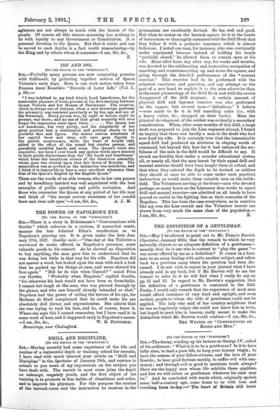DRILL AND DISCIPLINE.
[To THE EDITOR OF THE "SPECTATOR."] SIR,—Having recently had some experience of the life and routine of a regimental depot or training school for recruits, I have read with much interest your article on " Drill and Discipline" in the Spectator of January 19th, and venture to submit to you some of my impressions on the subject you have dealt with. The recruit in most cases joins the depot an unkempt, ungainly youth, and the first object of his training is to promote in him habits of cleanliness and order, and to improve his physique. For this purpose the routine of the barrack-room and the instruction he receives in the gymnasium are excellently devised. So far, well and good. But when he comes on the barrack-square, he is in the hands of instructors so thoroughly saturated with the Drill Book that they follow it with a pedantic exactness which is almost ludicrous. I noted one man, for instance, who was continually under reprimand because instead of holding his hands "partially closed," he allowed them to remain open at his side. Hour after hour, day after day, for weeks and months, was devoted to the exhilarating and instructive occupation of marching and countermarching up and down the square, and going through the detailed performance of the manual exercise." This exercise had to be performed with the minutest exactness and precision, and any attempt on the part of a new hand to explain it to the men otherwise than in the exact phraseology of the Drill Book met with the severe disapproval of the drill sergeant. A certain amount of physical drill and bayonet exercise was also performed on the square, but several men—" defaulters," I believe —were made to do it in full marching order (i.e., with a heavy valise, &c., strapped on their backs). Here the physical development of the soldier was evidently a secondary consideration. When, after some months of this drill, a large draft was prepared to join the Line regiment abroad. I found on inquiry that there was hardly a man in the draft who had ever fired his rifle. It is certainly true that the interminable squad drill had produced an alertness in obeying words of command, but beyond this how far it had enhanced the use- fulness of the men in the field would be difficult to say. It struck me forcibly that under a sounder educational system all, or nearly all, that the men learnt by their squad drill and manual exercise should have been taught them at school, and that when they entered the depot to be trained as soldiers they should at once be able to come under such practical instruction as would make them valuable men on the battle- field. The Volunteers serving at the front—men who devoted perhaps as many hours as the Linesman does weeks to squad drill and manual exercise—are admitted on all hands to have proved as useful in the fighting line as their comrades of the Regulars. This has been the case everywhere, as in counties like my own the Line recruit and the Volunteer recruit are drawn from very much the same class of the population.—


































 Previous page
Previous page